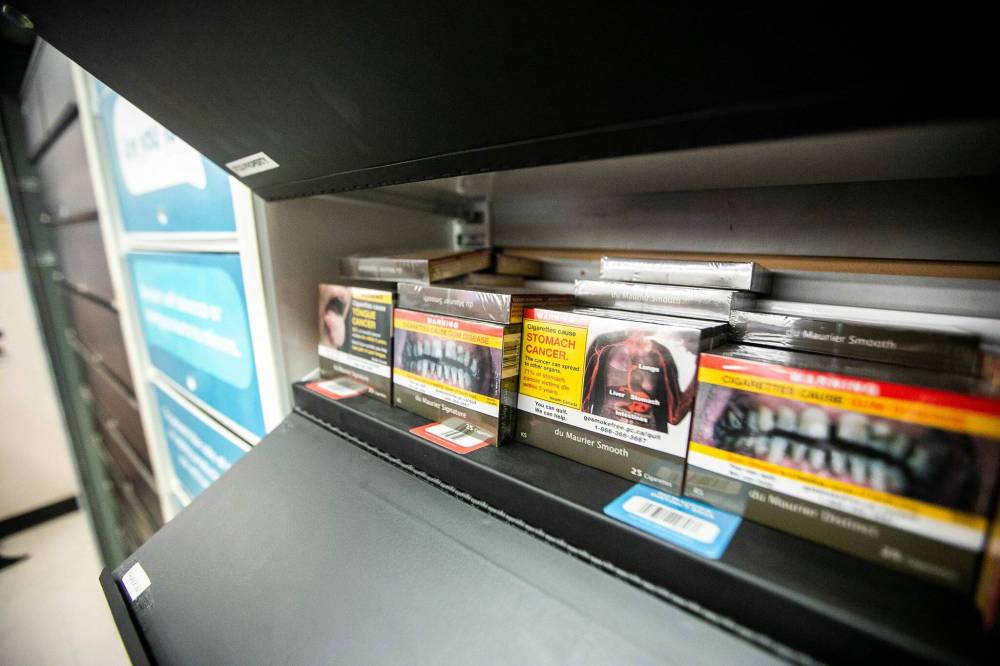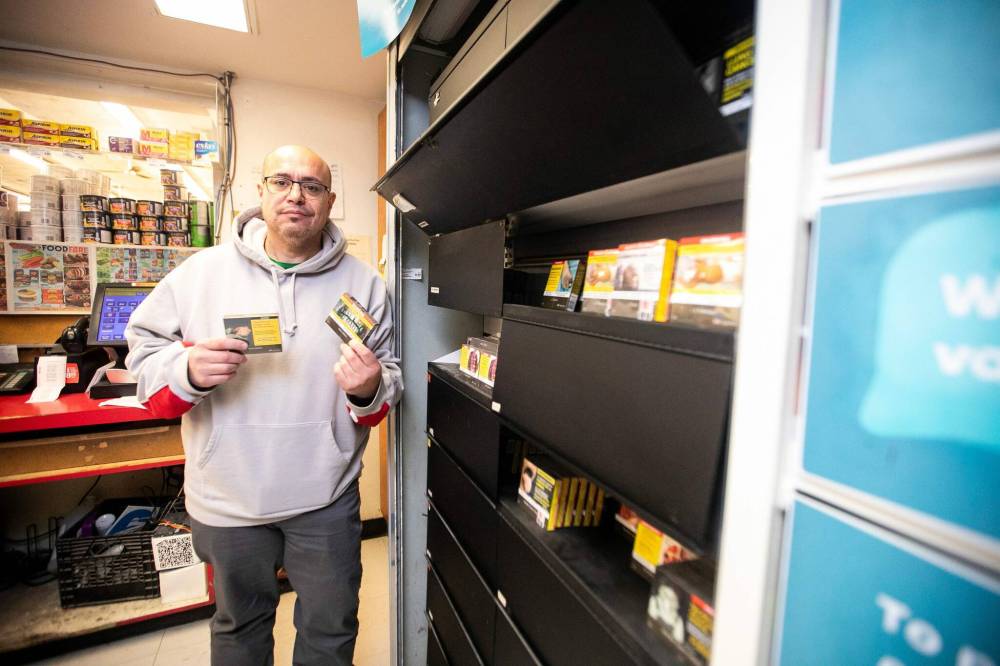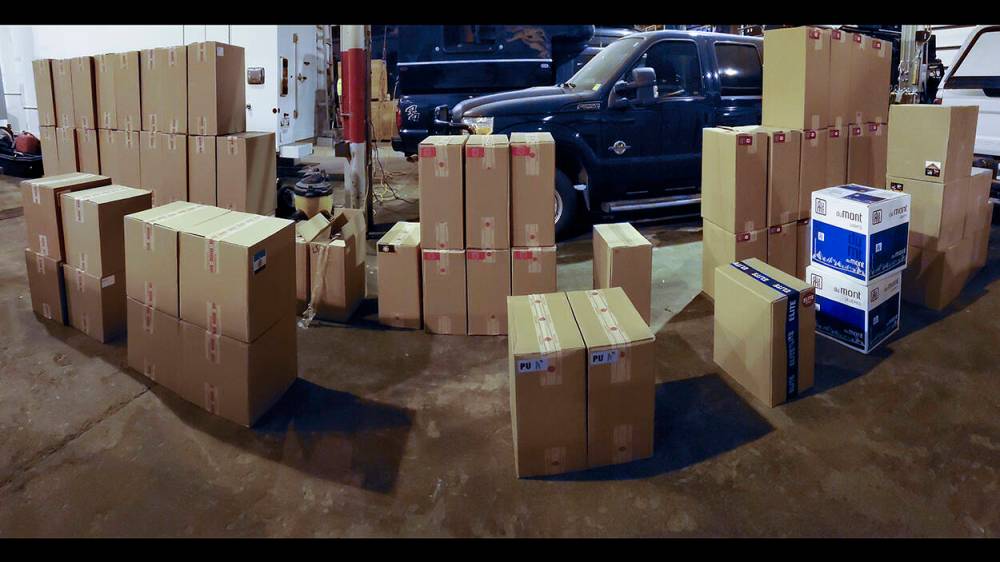Burned by illegal cigarettes ‘Not a fair marketplace’: neighbourhoods losing convenience stores, province losing tax revenue as flow of illicit smokes becomes flood, industry advocate says
Read this article for free:
or
Already have an account? Log in here »
To continue reading, please subscribe:
Monthly Digital Subscription
$0 for the first 4 weeks*
- Enjoy unlimited reading on winnipegfreepress.com
- Read the E-Edition, our digital replica newspaper
- Access News Break, our award-winning app
- Play interactive puzzles
*No charge for 4 weeks then price increases to the regular rate of $19.00 plus GST every four weeks. Offer available to new and qualified returning subscribers only. Cancel any time.
Monthly Digital Subscription
$4.75/week*
- Enjoy unlimited reading on winnipegfreepress.com
- Read the E-Edition, our digital replica newspaper
- Access News Break, our award-winning app
- Play interactive puzzles
*Billed as $19 plus GST every four weeks. Cancel any time.
To continue reading, please subscribe:
Add Free Press access to your Brandon Sun subscription for only an additional
$1 for the first 4 weeks*
*Your next subscription payment will increase by $1.00 and you will be charged $16.99 plus GST for four weeks. After four weeks, your payment will increase to $23.99 plus GST every four weeks.
Read unlimited articles for free today:
or
Already have an account? Log in here »
Hey there, time traveller!
This article was published 06/12/2024 (368 days ago), so information in it may no longer be current.
Illegal cigarette sales have contributed to a mass decline in Manitoba convenience stores and the loss of millions of dollars in provincial tax revenue, a national convenience store association warns.
The Convenience Industry Council of Canada — which counts 7-Eleven, On the Run and Couche-Tard locations among its members — clocked 947 Manitoba convenience stores in 2020.
Last year, the number was 847.
“Between facing thefts (and) vandalism and the increase in contraband tobacco, it’s really hard for convenience stores to stay in business,” said Sara MacIntyre, Convenience Industry Council of Canada vice-president for Western Canada.
MIKAELA MACKENZIE / FREE PRESS Cigarettes for sale at the Maryland Food Fare.
Theft and illegal smokes are the main reasons she’s heard cited when Manitoba shops close their doors.
The Toronto-based council commissioned an EY study on the growth of contraband tobacco in five provinces, including Manitoba.
Nearly half of tobacco sales in the keystone province — 45 per cent — were illegal in 2023, EY’s findings estimate. It placed the province’s tax revenue loss that year at roughly $60 million.
Between 2019 and 2023, Manitoba noted a 33 per cent decline in legal cigarette sales.
Cigarettes trade hands far less often at Korner Stop on Sherbrook Street in Winnipeg. Shop owner Mike Williams estimates he sells 35 packs a day — a plunge from the 100 or so he’d sell before the COVID-19 pandemic.
“They’re selling three packs of cigarettes for $13,” he said of shops offering illegal products. “I sell my cheapest pack for like $18.”
He alleged multiple locations within a half-kilometre from his shop sell illicit cigarettes under the table, not adding taxes and sometimes not holding the appropriate tobacco licence. The locations might be fined if caught, but will continue operating eventually, Williams said.
“It’s not a fair marketplace,” he added. “It’s taken a lot of traffic away from the people that are trying to make an honest living.”
“It’s not a fair marketplace. It’s taken a lot of traffic away from the people that are trying to make an honest living.”–Mike Williams
Korner Stop has had regulars vanish, taking with them their money spent on cigarettes, newspapers and coffee. Meanwhile, Williams said, a number of vendors have approached him, offering to create a linkage to illegal cigarettes.
His experience is shared with other local entrepreneurs. Deborah Na, who operated V-Maxx on Vaughan Street, recalled being offered illegal smokes in bags and losing customers after declining to sell $5 cigarettes.
Na has since moved to Toronto, leading to the closure of V-Maxx earlier this year. Selling illegal smokes is a “risky move” some shop owners may take to stay competitive, Na said in an interview.
Both V-Maxx and Food Fare on Lilac Street cut their most expensive cigarette options because people weren’t buying. Food Fare has seen a 50 per cent decrease in cigarette sales over the past five years, manager Ramsey Zeid estimated, noting a variety of factors may have led to the decline.
“It’s no secret that people are struggling financially,” Zeid said. “If they can find cheaper cigarettes, people are going to do that.”
JOHN WOODS / FREE PRESS FILES Deborah Na, owner of now-shuttered V-Maxx Convenience Store, said selling illegal smokes is a “risky move” some shop owners may take to stay competitive. 
Teresa, who declined to give her last name, has been purchasing illegal cigarettes over the last 10 years.
Smokes were easy enough to find a decade ago — pick a corner store in the North End — but now, it’s even easier, she said. People sell them online and out of their own houses. Ironically, she’s paying less for illegal cigarettes than she did in the past, Teresa added.
“Every single friend I have goes for the illegal (option),” Teresa said.
Sources close to the industry say many of Manitoba’s illegal cigarettes come from a manufacturing plant in Six Nations, an Ontario reserve. In 2020, the Ontario Provincial Police seized 11.5 million contraband cigarettes alongside illicit drugs, handguns and cash at Six Nations.
“This is a sophisticated organized trafficking syndicate that operates across the country,” said MacIntyre from the Convenience Industry Council.
Readily available contraband tobacco and an affordability crisis have likely led to the recent spike in illegal cigarette sales, MacIntyre noted. It’s become a more prominent issue since the COVID-19 pandemic, she added.
The cigarettes can be more dangerous because they don’t always have self-extinguishing filtres like legal ones and they aren’t made in facilities subject to health inspections, official said.
None of the entrepreneurs the Free Press spoke to faulted smokers for buying cheaper packs. Greater enforcement against manufacturers and traffickers is warranted, they said.
MIKAELA MACKENZIE / FREE PRESS Food Fare manager Ramsey Zeid says Food Fare has seen a 50 per cent decrease in cigarette sales over the past five years. 
“Is there a way that we can reduce the taxes … so that people can afford to buy cigarettes that are maybe safer and then the government gets their taxes?” Zeid said.
Taxes typically make up 60 per cent or more of a legal pack’s cost, MacIntyre said. In an April 2024 document, Physicians for a Smoke-Free Canada broke down an “average” pack of Manitoba cigarettes costing $17.40; taxes and a federal excise duty consumed $11.82 of the price.
The Convenience Industry Council of Canada is calling for a moratorium on new tobacco taxes, more local enforcement against illegal tobacco sales and a dedicated Crown prosecutor focused on contraband tobacco offences, among other things.
Manitoba Finance has a special investigations unit that addresses tobacco sales. Finance Minister Adrien Sala wasn’t made available for comment.
“(The special investigations unit) is continuing to partner with other provinces to develop the most effective toolkit to prevent illegal sales,” a provincial spokesperson wrote in a statement, adding the unit works with police forces like the RCMP.
The unit has observed revenue from illegal tobacco supporting drug trafficking, human trafficking and firearms smuggling, the spokesperson continued.
RCMP HANDOUT Illegal cigarettes seized during Project Dawgpound.
Manitoba tax investigators announced their largest seizure of illegal cigarettes from a single person in 2022, when they pulled more than three million smokes. It led to a complete seizure of 3.4 million cigarettes, involving six suspects.
First-time tax act offenders face fines from $1,000 to $10,000, with a possibility of six months imprisonment. Fines can reach $100,000 and up to two years imprisonment for third or subsequent offences.
Penalties must be assigned, in specific circumstances, in an amount equal to five times the tax that would be payable on legal tobacco. Related charges can be brought under the Criminal Code, a provincial spokesperson noted.
Manitoba doesn’t centrally track the amount of illegal tobacco seized in the province, the spokesperson added.
The RCMP has identified some 175 gangs involved in contraband tobacco across Canada, producing as many as 10,000 cigarettes per minute, a Winnipeg Crime Stoppers webpage shares.
For now, Williams at Korner Stop is shifting his focus to groceries. He can’t rely on cigarette sales anymore, he said.
gabrielle.piche@winnipegfreepress.com

Gabrielle Piché reports on business for the Free Press. She interned at the Free Press and worked for its sister outlet, Canstar Community News, before entering the business beat in 2021. Read more about Gabrielle.
Every piece of reporting Gabrielle produces is reviewed by an editing team before it is posted online or published in print — part of the Free Press‘s tradition, since 1872, of producing reliable independent journalism. Read more about Free Press’s history and mandate, and learn how our newsroom operates.
Our newsroom depends on a growing audience of readers to power our journalism. If you are not a paid reader, please consider becoming a subscriber.
Our newsroom depends on its audience of readers to power our journalism. Thank you for your support.


